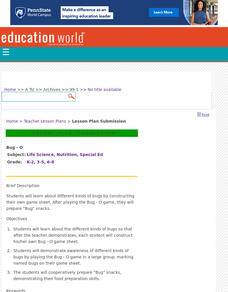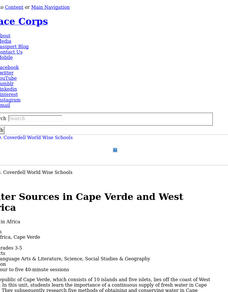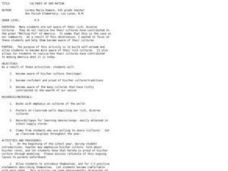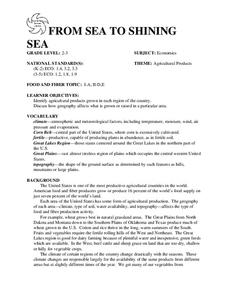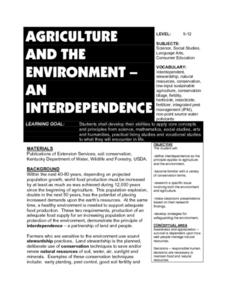Curated OER
Diet: Find the Carbohydrates
Students discover and discuss the functions of carbohydrates. Once they have taken notes and completed worksheets, they perform experiments using iodine to test for starch. Lesson topics include how carbohydrates are processed by the...
Curated OER
Taming the Wild Aurochs
Fourth graders assess the development of animal husbandry, outline it in detail as well as arrange the steps in sequential order. In addition, they discuss how certain animals came to be domesticated, concentrate to research on one of...
Curated OER
Ecosystems
Sixth graders perform various labs, create presentations, and do hands on activities to explore the ecosystem.
Curated OER
Bug-O
Middle school special education students (moderate to severe) learn about insects by playing an entomological version of bingo. They cut out pictures of different bugs and glue them onto a grid. Place the game card inside a sheet...
Curated OER
A LOT OF THIS FOR A LITTLE OF THAT
Students describe the import and export of agricultural products and gain a comprehension of the concept of supply and demand. They discuss exports and imports. Students have small world maps on each desk, they identify the countries...
Curated OER
Earth Water Distribution and Water Consumption
Young scholars explore the need for conserving fresh water and understand that it is a limited supply. In this water consumption lesson students participate in an activity and answer questions.
Curated OER
Human Needs
Students investigate human needs and how they have adapted to different environments. They complete an experiment to discover the effect of stress on muscles. They use the food pyramid to create a plan for healthy eating.
Curated OER
Ocean Currents
Students label the names, relative temperature, distribution, and direction of flow of major ocean currents on a world map. They also explore and model the natural forces that affect the movement of ocean currents through demonstrations...
Curated OER
Disease and Nutrition
Students study disease and explore how it can be avoided or treated with simple solutions. In this investigative lesson students create a food chart for two weeks for themselves to track and be sure they are getting all the...
Curated OER
Mineralization
Students investigate demineralization and remineralization and find common foods that promote these things. In this investigative lesson plan students compare effects of this on fluoride and non-fluoride treated substances and...
Curated OER
Water Sources in Cape Verde and West Africa
Learners analyze the importance of a fresh water supply in Cape Verde, researching five methods of obtaining and conserving water there. Students create and present displays demonstrating their understanding of the methods of water...
Curated OER
Where Do We Get Clean Water?
Students investigate the concept of a filter. They use simple supplies in order to construct one after watching a demonstration performed by the teacher. An important warning that the project water is not clean for drinking is included....
Curated OER
Kinetic Theory
Students describe how molecules of the different phases of matter move according to the Kinetic Theory. In this chemistry instructional activity, students observe and participate in teacher demos. They give real world applications of the...
Curated OER
Cultures of Our Nation
Students bring in family items that represent their culture and present them to the class. In this culture lesson plan, students can bring in food, music, dance, pictures, and more.
Curated OER
FROM SEA TO SHINING SEA
Identify agricultural products grown in each region of the country.
Discuss how geography affects what is grown or raised in a particular area.1. Hand out a copy of the two activity sheets "Food From Sea to Shining Sea" to each student....
Curated OER
AT YOUR FINGERTIPS
The student will locate countries on a world map from which we import foods that our climate prevents us from growing locally.1. Discuss the term "export." Divide middle schoolers into groups of four. Give the groups
five minutes to...
Curated OER
At Your Fingertips
First graders observe a variety of different foods including kiwi, banbnas, coffee, chocolate and discuss where they come from. They discuss the terms import and export then identify the locations where the items came from and their...
Curated OER
Decorating Objects....And Re-Decorating
Young scholars decorate cups or bowls with thematic designs that represent Chinese culture. For this decorating lesson plan, students will decorate their cups or bowls and then “sell” these works of art to partners role-playing as French...
Curated OER
Spaceship Earth
Students consider the earth and its problems as a system. They examine the fragility of that system when population, pollution, 1st world verse 3rd world, terrorism, etc., are considered as interactive parts of a spaceship earth.
Curated OER
NEXT YEAR'S SEEDS
1. Bring a pound or two of sunflower seeds in their shells to class, along with five or six small paper or Styrofoam cups and a bowl large enough to hold the seeds. Make several copies of the situation cards printed on the following...
Curated OER
Outdoor Art
Learners create art projects outside. In these outdoor art lesson plans, students use items in nature to enhance their creativity. They are encouraged to paint rocks, use fences for collages, weave sticks/feathers through picket fences,...
Curated OER
How Much Azatrine?
Learners understand the connections among people, places, and environments in the local school and community, Kansas and its surrounding states, the U.S. and its region, and the world.
Calvin Crest Outdoor School
Survival
Equip young campers with important survival knowledge with a set of engaging lessons. Teammates work together to complete three outdoor activities, which include building a shelter, starting a campfire, and finding directions in the...
Curated OER
Agriculture and the Environment
Young scholars investigate the interdependence of agriculture and the environment. They research areas of interdependence and provide examples of situations where farmers are practicing conservation in the local area. Their findings are...



